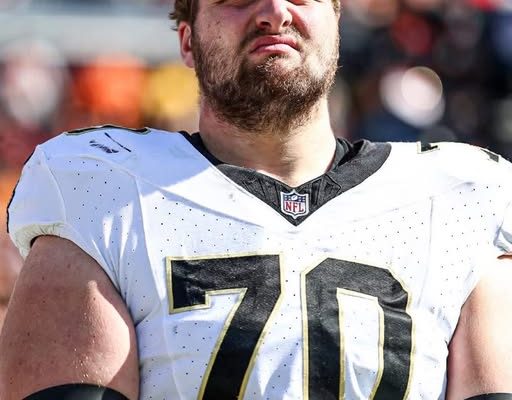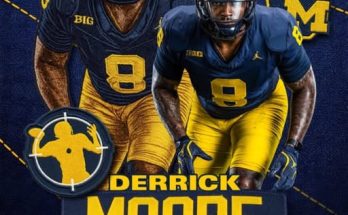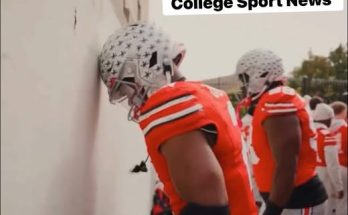At the buzzer: the New Orleans Saints have sent former first‑round lineman Trevor Penning to the Los Angeles Chargers, per Adam Schefter — and the move comes right on the heels of the Chargers learning that tackle Joe Alt will undergo season‑ending ankle surgery. ESPN.com+1 The Times of India+3Reuters+3Reuters+3
New Orleans dealt Penning in‑season, acquiring a 2027 sixth‑round pick in return from the Chargers. Reuters+1 The context around the move is critical: the Chargers had already lost their highly‑touted left tackle, Pro Bowl lineman Rashawn Slater, to a patellar tendon rupture in August, and now Joe Alt’s ankle injury means they will finish the 2025 campaign without both starting tackles. Reuters+2ESPN.com+2
Let’s unpack the layers here: the background of the players, the urgency for L.A., what this means for New Orleans, and the ripple effects across the division and league.
Trevor Penning entered the NFL as a first‑round pick of the Saints (19th overall in 2022) out of the University of Northern Iowa. Over the Cap+2Wikipedia+2 He stands 6‑foot‑7, 333 pounds, and was projected as a future left tackle at the time of his draft. Over the Cap+1 His rookie season was derailed by injury; he missed time with a torn ligament in his foot in 2022. Wikipedia+1 In 2024 he started all 17 games at right tackle for New Orleans. Wikipedia+1 In 2025 he had been shifted inside to left guard for the Saints, starting six games there prior to the trade. NFLTradeRumors.co+1 According to Pro Football Focus metrics, his production at guard in 2025 had him ranked 65th out of 78 qualifying guards. Bolts From The Blue So while the tool‑box of size and tackle experience is attractive, he was not thriving at guard in his most recent role.
Joe Alt, by contrast, is one of the newest, most gifted tackles in the NFL. Drafted 5th overall in 2024 out of Notre Dame, he made the All‑Rookie Team in his first season. Wikipedia+2ESPN.com+2 He had been shifted to left tackle this season to replace Slater, giving the Chargers what they hoped would be a long‑term blindside solution. But in Week 9 against the Titans he suffered a high ankle sprain — his second this season — and will now require season‑ending surgery. CBS Sports+1 Reflecting the gravity of this, commentator Dan Orlovsky said this is an enormous loss for the Chargers. ESPN.com The Chargers’ offensive line has been decimated: Slater out, Alt out, guard Mekhi Becton sidelined, right tackle Bobby Hart injured. ESPN.com+1
Given this backdrop, the Chargers’ move to acquire Penning makes sense as a rapid damage‑control measure. With both their projected tackles out for the season, they needed experienced, affordable help. Penning fits as a former first‑rounder with tackle experience and is still on his rookie contract (4 year total ~$14.1 m fully guaranteed). Over the Cap+1 The trade sends a message: the Chargers believe they’re still in contention (they currently hold a 6‑3 record, trailing the division lead) and aren’t ready to give up this season despite the injury hits. Reuters For New Orleans, by contrast, this is a “move away” of a former high draft pick, a sign that the organization views its 2025 season as lost (they stand at 1‑8) and are pivoting toward future assets. Reuters+1
Looking at the fit: For L.A., what exactly does Penning bring? He brings size, tackle pedigree, and flexibility. The Chargers could deploy him at either tackle spot, or even guard, though given his history at guard hasn’t been stellar, tackle is the more likely role. Reports indicate that the Chargers view him more as a tackle option given their depleted depth, rather than as a guard. Bolts From The Blue+1 On paper, he gives them an “option” rather than forcing a rookie or lesser experienced lineman into the void. The risk: Penning is still young, still working through inconsistencies and injuries, and this is a somewhat low‑cost trade (just a 6th‑rounder in 2027) so the Saints gave up little and the Chargers are accepting some uncertainty.
For the Saints, moving Penning also frees up organizational bandwidth and signals they are lowering expectations for 2025. With injuries and losses mounting, the Saints can recoup an asset and begin reallocating playing time and resources to younger or unproven linemen or focus on other roster building. It may also help that Penning is in the last year of his rookie deal, so the Saints avoid having to decide whether to pay him at a higher level given his mixed results.
The timing of the trade is important: It happened just before the NFL trade deadline and in reaction to the Alt injury. News broke that Joe Alt will undergo season‑ending ankle surgery on Nov 3, 2025. The trade was reported Nov 4. The Chargers clearly were acting quickly to fill a glaring hole. That urgency is underscored by coverage calling their offensive line situation “emergency mode.”
What does this mean for the Chargers’ season? Protecting their franchise quarterback Justin Herbert has been a major priority; the loss of both top tackles jeopardizes that protection. Joe Alt’s injury already coincided with dips in offensive efficiency when he’s off the field. Bringing in Penning provides some stabilizing influence and depth, though it is not a guarantee that the line will perform at elite levels. The Chargers may still shuffle roles, consider other linemen for starting jobs, and might even address the line again in future trades or the draft. The move also speaks to the Chargers’ ambition: despite the setbacks, they believe they are playoff‑capable or at least want to stay alive in the division. On the flip side, the Saints’ trade signals that their 2025 hopes are minimal, and that they are prioritizing future flexibility over immediate results.
For the wider NFL landscape, this trade is one of the more subtle but still meaningful deadline moves. It didn’t involve first‑rounders swapping hands or blockbuster amounts, but it addresses the trenches — where many trades are overlooked but are nonetheless loud in effect. The fact that the Chargers acquired a first‑rounder’s lineman for just a 2027 sixth‑round pick underscores both the desperation of their situation and the Saints’ willingness to move on. It also reflects how draft capital is valued in today’s market: a former first‑round pick can still be had relatively cheaply if circumstances (injury, performance) dictate. In addition, this deal complements the wave of trades we’ve seen around the deadline this year; although it is not the biggest deal, it shows how depth and necessity can drive moves even for teams that are still in contention.
How this trade will play out remains to be seen. Penning will need to adjust to a new scheme, new coaches, new teammates, and potentially a new position (or reaffirm his role as tackle). The Chargers will need him to deliver quickly. Meanwhile, the Saints will shift focus — which players fill the vacated reps? How will they rebuild going forward? For Joe Alt, his season ends in disappointment, but with surgery ahead and the hope of fuller recovery. The Chargers’ offense now pivots on how well the line (with Penning aboard) can hold up down the stretch.



